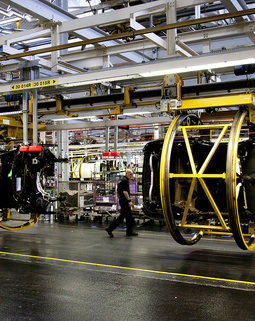Nigeria has great potential of becoming a frontline vehicle manufacturing country because the few indigenous companies that have dared to take that path have produced exceptional vehicles.
Nigeria’s auto production industry has come a long way – A local car market is also characterized by competition from imported used vehicles – an automotive plan was developed in 2013 to ensure that vehicles can be manufactured locally – Foreign car manufacturers are looking towards Nigeria as they build capital on their ventures in Africa.
Under the administration of President Olusegun Obasanjo who assumed office in 1999, Nigeria's economic managers intensified efforts to strengthen the country's auto manufacturing industry, by investing in state-of-the-art technology, training and infrastructure to upgrade Super Power Automotive Complex (SPAC), incorporating new companies and forging joint-venture partnerships with automakers.
All the latest updates on the automotive industry in Nigeria are Here!
Nigeria’s auto production industry has come a long way since the 1950s with the production of passenger cars and commercial trucks
Nigeria’s automotive industry developed in the late 1960s as a result of government intervention. The industry was designed to serve the government, but it was also expected to reduce Nigeria’s dependence on motor vehicle imports and create local jobs.
To achieve this, two-car manufacturing companies were established: Peugeot Automobile Nigeria (PAN) and Anambra Motor Manufacturing Company (ANAMMCO). During this period, the government created incentives for developing backward integration in the industry by allowing some manufacturers to import raw materials at concessionary rates.
New entrants into the market include two Chinese companies – Innoson Motors and Peugeot Automobile Nigeria Ltd, and the UAC-Nissan joint venture which recently started production of Nissan vehicles in Lagos.
Innoson was established in 2007 in Nnewi, Anambra State and produces Innoson Vehicles (IVM) brand of passenger cars, SUVs and pick-up trucks from completely knocked down (CKD) kits. The company also has a plant in Enugu state where it assembles motorcycles with an installed capacity of 50,000 units per year
The UAC-Nissan joint venture, which was established in July 2013 and operates under the name
The local car market is also characterized by competition from imported used vehicles known as ‘tokunbo’
The Nigerian automobile industry is highly underdeveloped and the government has been seeking to develop it further. The country's auto sector is currently dominated by the importation of used vehicles (Tokunbo), which is prohibited in some countries due to concerns about safety, emissions, and wear and tear on roads.
The local car market is also characterized by competition from imported used vehicles known as ‘tokunbo’. The number of cars produced in Nigeria stood at only about 2,000 units in 2016, according to the National Automotive Council.
Policies that have been implemented by the Nigerian government to protect the local industry include a 35% levy on imported used cars, as well as a ban on cars older than 10 years from being imported. Local manufacturers are also given tax breaks and other incentives to encourage production.
In line with this, an automotive plan was developed in 2013 to ensure that vehicles can be manufactured locally in Nigeria and the country becomes a hub for exporting vehicles to neighboring West African countries.
The Nigeria Motor Industry Development Plan (NMIDP) was launched in 2013. The NMIDP is a short-term strategy (2013 to 2016) designed to attract investment and develop capacity in the local automotive industry in order to ensure that vehicles can be manufactured locally. The plan has four main pillars:
- assisting firms to obtain certification and become internationally competitive;
- providing technical assistance for firms seeking partnerships to produce vehicles with global partners;
- developing local vehicle design capability;
- developing a competitive local automotive industry by improving linkages between local suppliers, assemblers and dealers.
The policy of the NMIDP is directed at the creation of an enabling environment for the automotive assembly and manufacturing industry.
As such, it encourages assemblers, manufacturers, parts suppliers and dealers to follow the necessary standards that meet international best practices and regulations.
These include setting up quality control systems, ensuring quality management systems are in place and creating an environment where Nigerian agencies can develop the capacity to enforce these standards.
Foreign car manufacturers are looking towards Nigeria as they build capital on their ventures in Africa.
The Motor Vehicle Production Industry in Nigeria has the potential to become one of the largest sectors in the country, providing fuel and opportunities for economic growth.
On CarNija, you can meet with car sellers in Nigeria and bid on the cars they're selling!
Foreign car manufacturers are looking towards Nigeria as they build capital on their ventures in Africa. Honda, Volkswagen, Ford, Hyundai, Toyota and Nissan all have production facilities in Nigeria.
Nigeria is an emerging market with a population of over 200 million people. The country also has a rising middle class that continues to grow as the economy expands. As this sector continues to grow, it will create more jobs and lead to additional growth in other areas of the Nigerian economy.
The Motor Vehicle Production Industry in Nigeria is part of the larger manufacturing industry. It is based on the production of automobiles for use by consumers and businesses both within Nigeria and for international export.
The Motor Vehicle Production Industry in Nigeria employs thousands of people and provides fuel for economic growth throughout the country. It is one of the most important sectors in Nigeria’s economy as it contributes significantly to GDP (Gross Domestic Product).
In addition, this industry provides employment opportunities that help reduce unemployment rates across Nigeria by providing jobs for those who may otherwise not have access to work due to a lack of education or experience necessary to qualify them for employment elsewhere.





